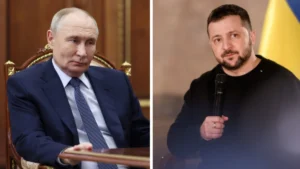
The president of Ecuador, Daniel Noboa, this Friday again decreed a new state of emergency at the national level for 60 days, this time because of the serious energy crisis that the country is going throughs, with blackouts lasting up to eight hours due to not being able to meet the national demand for electricity.
Through a decree, Noboa ordered “the mobilization and intervention of the National Police and the Armed Forces throughout the national territory, duly coordinated, to ensure the security of critical energy infrastructure facilities to prevent sabotage, terrorist attacks or other threats that may affect their operation“.
Since last Sunday, Ecuador has been suffering daily blackouts in different areas lasting up to eight hours, as the Mazar reservoir, the second largest in the country, has run out of sufficient water level, which allows a complex of three hydroelectric plants to operate with a power 1,757 megawatts, equivalent to around a third of national demand.
Added to this is the cutoff of the electricity supply from Colombiawhich also faces a situation of great drought that does not allow it to generate surplus electricity to export to Ecuador.
This new state of exception occurs on the eve of the referendum called by Noboa for this Sunday where he seeks to carry out with popular support a series of reforms in matters of security, justice, investments and employment.
It also comes less than three weeks after the previous state of emergency endedissued at the beginning of January to address the wave of violence by organized crime gangs, after a series of attacks and violent actions that included the takeover of the TC Televisión channel by a group of armed men during a live broadcast.
The previous state of emergency was accompanied by the declaration of ‘internal armed conflict’, the same one that has been maintained until now and that serves the Ecuadorian Government to consider 22 criminal gangs as terrorist groups and non-state belligerent actors that can be neutralized by the Armed forces.
Thus, in the week of the referendum, blackouts returned to Ecuador, a situation that Ecuadorians had already experienced at the end of last year due to another similar situation of drought in the main hydroelectric plants and a drop in supply from Colombia.
On that occasion the electricity outages lasted up to four hours, half as long as at the current time, which Noboa attributed to alleged sabotage, to the point that his administration filed a complaint against twenty-two people for allegedly hiding information and not giving voice to early warning.
Among the people who are part of the presidential accusation is the former Minister of Energy and Mines Andrea Arrobo, whom Noboa asked for her resignation in a public event on Tuesday, after last Friday she had ruled out the return of blackouts to Ecuador in the short term.
Even the Secretary of Communication of the Presidency, Roberto Izurieta, went so far as to state on Thursday that they have suspicions that the Mazar reservoir was deliberately emptied, something that was denied by the Electric Corporation of Ecuador (Celec), which operates said reservoir.
According to data from this company, the level of the reservoir, located in the southern Andean province of Azuay, whose capital is Cuenca, has been gradually decreasing since the beginning of this year, and apparently it hasn’t rained enough in that time for it to be replenished.
The prolonged electricity outages forced the Government to decree the suspension of the working day and school classes for this Thursday and Friday, although many private businesses continued to operate normally, since in Ecuador only three out of every ten people of working age have a formal job.
Source: https://www.noticiascaracol.com/mundo/daniel-noboa-decreta-un-nuevo-estado-de-excepcion-en-ecuador-por-grave-crisis-energetica-cb20


